
36 minute read
Support at home
What is CHSP? Subsidised by the Australian Government, CHSP is an entry level home help program if you are mostly – but not completely – able to live and cope on your own, and don’t yet need higher levels of support at home. The program can also help your carer. If your carer needs to attend to everyday activities, the CHSP can arrange for someone to help you while they are away. What types of services are provided? CHSP services provided in the community may include: Social support – social activities in a community-based group setting Transport – help to get out and about for shopping or appointments Services provided at home may include: Domestic assistance – household jobs such as cleaning, clothes washing and ironing Personal care – help with bathing, showering, dressing, or toileting Home maintenance – minor general repair and care of your house or yard, for example, changing light bulbs or replacing tap washers Home modification – minor installation of safety aids such as alarms, ramps and support rails in your home Nursing care – a qualified nurse comes to your home and may, for example, dress a wound or provide continence advice Some CHSP services can be provided either at a community centre or in your home such as: Food services – If you are finding it difficult to prepare meals, services may include providing meals at a community centre, helping with shopping for food, preparing and storing food in your home, and delivering meals to your home. Allied Health support services – If you have particular health problems, for example with speech or walking, or need help with ongoing problems resulting from an accident or illness, you may be able to access allied health services. They include services such as physiotherapy, podiatry, speech therapy, occupational therapy and advice from a dietitian. Who is CHSP for? If you are 65 years or older, or 50 years or older and identify as an Aboriginal and/or Torres Strait Islander person, are still living at home and need help to continue living independently, you or your carer could apply for home help services under the CHSP by contacting the My Aged Care contact centre on 1800 200 422.
CHSP
We have been providing individual and innovative care tailored to our clients’ needs since 1992.
SDS currently has the following government contracts to deliver services:
· WA Home and Community Care program, this is now for people under 65. · Commonwealth Home Support
Programme · Home Care Packages · Veterans Home Care Services · Private Services · National Disability Insurance Scheme

Let us join you on your journey.
(08) 9498 4800 E: info@sdsa.org.au www.southerndistricts.org.au
CHSP
Am I eligible? You will need a home support assessment to determine exactly what help you need at home. The assessment will be done by a representative of the Regional Assessment Service (RAS). A local RAS assessor will look at your ability to cope with various activities in your daily living. Together you will be able to work out what sort of help and how much you need, and what it might cost. Urgent needs If you’re in a situation where you have an urgent need for home support services and your safety would be at risk if those needs are not immediately met, it may be possible to receive CHSP services before you have been assessed by a RAS. This only happens in exceptional circumstances and is only for a limited time until an assessment can be organised to determine long term care options. Services generally considered to relieve an urgent need for care include nursing, personal care, meals and transport. It will depend on your personal circumstances whether you’ll be able to receive interim services before an assessment. Call the My Aged Care contact centre on 1800 200 422 to find out more. Who pays for CHSP services? CHSP is subsidised by the Government however there generally is still a fee for each service. You are encouraged to contribute towards the cost of your care if you are able to do so.

YOU’RE IN SAFE HANDS
Perth’s expert local team are here to help you get the best in-home care.
Why Choose KinCare?
9 Dedicated, screened and trained carers 9 Your services delivered within your chosen time window 9 Your own Customer Care Manager 9 Support 24 hours a day, 7 days a week 9 Over 28 years experience in supporting older Australians
Speak with your local team today
1300 575 164
The amount you contribute depends on the type and number of services you require and can differ from one service provider to the next. Some organisations may charge a set fee for their services, while others may ask for a voluntary donation, charge a membership or subscription fee. How much you pay is discussed and agreed upon between you and your service provider. The rate is set before you begin receiving the relevant services. If you are receiving multiple services from one or more service providers and these services overlap, it may be possible to ‘bundle’ the cost for these services. To find out specific costs you should contact your service provider. Pre-1 July 2015 HACC, NRCP, DTC and ACHA clients If you accessed Home And Community Care (HACC), National Respite for Carers Programme (NRCP), Day Therapy Centres (DTC) or Assistance with Care and Housing for the Aged (ACHA) prior to 1 July 2015, you may retain access to these services or equivalent CHSP services until other suitable services become available, or until the service is no longer required. You can find CHSP funded services starting on page 153 of the directory section or online on AgedCareGuide.com.au.
CHSP
Cockburn Care we love to care
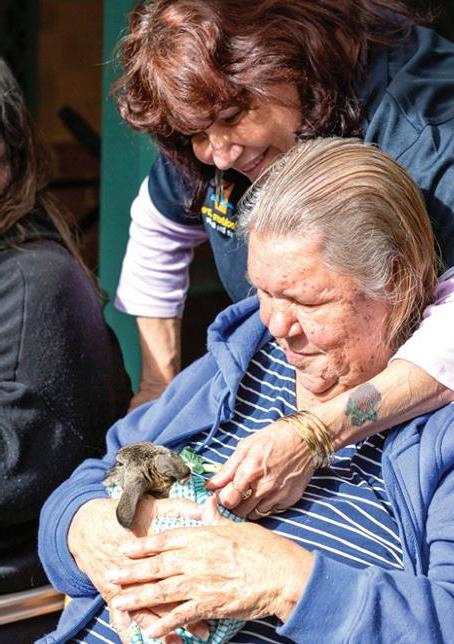
Social Club Stay active, make friends and get out and about in your community.
08 9411 3780 cockburn.wa.gov.au/cockburncare

Home Care Packages
Home Care Packages A Home Care Package (HCP) provides services that will help you to remain at home for as long as possible, as well as giving you choice and flexibility in the way that the care and support is provided.
There are four different levels of packages to support people with varying care needs, ranging from Level 1 support if you have basic care needs, to Level 4 which can support you if you have high level care needs. The HCP is allocated to you personally which gives you more control over the services you receive and who delivers those services. Once you have been allocated a HCP you can contact any preferred approved service provider to give you the care you need. Types of packages available There are four types of packages delivering different levels of care: 1 Level 1 supports people with basic care needs 2 Level 2 supports people with low level care needs 3 Level 3 supports people with intermediate care needs 4 Level 4 supports people with high level care needs The same type of care and services are provided under each HCP level, however, the funding differentiates depending on what package is allocated to you. The hours of care are increased at each level of care; more hours of care and services are delivered under Home Care Package Level 4 compared to Level 1. Package supplements – the ZDementia Supplement for people with dementia and the R Veterans’ Supplement for veterans with an accepted mental health condition – are available with any of the four levels of Home Care Packages.
Live at Home Happily and Comfortably with Home Care Assistance

Leading In Home Care Specialists
Customised Care Matching carers to meet clients’ preferences because ultimately to us, the most important person is you. Approved providers of Home Care Packages and CHSP. Services • Personal Care • Domestic Assistance • Meal Preparation • Medication Monitoring • Gardening • Nursing Services • Respite • Home Maintenance • Allied Health • Cognitive Therapeutics
Method Experts in Specialised Care • Palliative Care • Hospital to Home Care • Alzheimer’s and Dementia • Stroke and Parkinson’s Care • 24/7 and Live-in Care
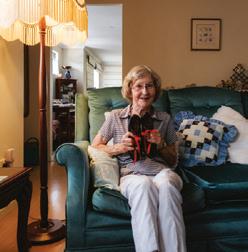
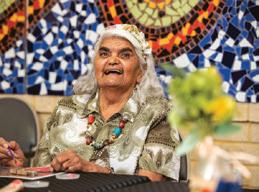
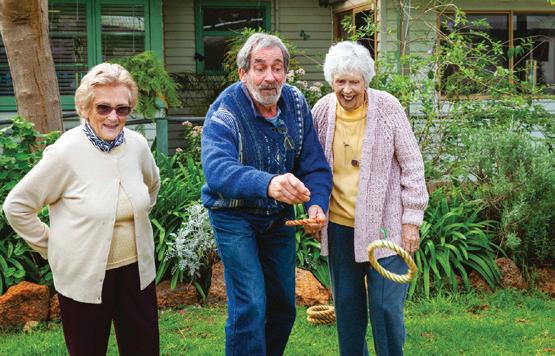

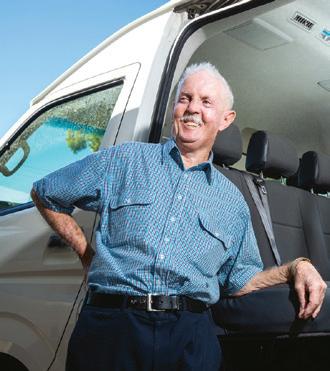
Some packages can be specifically for people who are e financially or socially disadvantaged, people with Y housing needs or at risk of homelessness, or for people who live in t rural, remote or isolated areas. Your care provider will apply for these subsidies and ensure you meet the eligibility criteria. Some providers might cater for people with a certain g cultural background or have staff that speak a foreign language. The ACAT assesses the types of care needs you may require. Someone eligible for Levels 3 and 4 HCP will be eligible for higher levels of residential care if they were to apply for it. If you are receiving care services through the previous Community Aged Care Package, Extended Aged Care at Home or Extended Aged Care at Home Dementia packages, you will continue to receive these services, but they will have a different name. For a list of HCP providers, see pages 143–150. What services are provided? Home Care Package services are based on your individual needs. Your provider coordinates the care and services to support you at home and these are agreed between you and your provider. Services may include: Personal assistance with bathing or showering, personal hygiene and grooming, dressing, toileting, and mobility Personal assistance with communication, including assistance to address difficulties arising from impaired hearing, sight or speech, or lack of common language Domestic assistance for household jobs Food services such as preparing meals or having meals delivered, assistance with using eating utensils and assistance with actual feeding, and providing enteral feeding formula Nursing services, including dressing wounds by providing bandages, dressings and skin emollients, as well as continence management and assistance in using continence aids and appliances Assistance in taking your medications Providing mobility equipment such as crutches, walking frames, wheelchairs and mechanical devices for lifting Home maintenance for care of your house or garden Modifications to the home, like installing safety aids such as alarms, ramps and support rails Transport and assistance for appointments or social activities Encouragement to take part in social and community activities
Home Care Packages
Home Care Services We Offer Approved Provider Home Care Packages Private Care 24 Hour Care at Home Personal & Respite Care Nursing & Palliative Care Dementia Care Medication Support Social Support & Meal Preparation Domestic Assistance & Transport Home and Garden Maintenance Providers for DVA, Veteran Community Nursing, Veteran Home Care Health Organisations Local Government Agencies Commonwealth Funded Agencies Member LASA (Leading Aged Service Australia)

When care is needed, continue living at home with our support. 24 hours a day (08) 9385 5100 / 0447 468 176 support@carenet.net.au www.carenet.net.au
Approved provider for Home Care Packages Level 1-4 24hr live-in care services Overnight respite care Personal care assistance (including medications) Light domestic assistance (cleaning, laundry etc.) Meal preparation & shopping Social support Transport to appointments and events in the community Respite for carers Farm sitting & House sitting Wheelchair transport Accompanied travel to long distance appointments inc national & international travel Consultation and support to access aged care assessments and funding

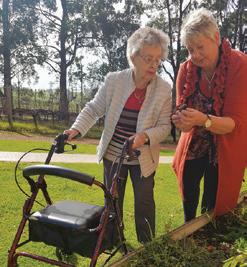
Ann Young

0476 035 233 Services/items not provided? The following services or items are not included in a package in any of the four levels of home care: Using the package money as a source of income for the consumer Purchase of food, except for enteral feeding requirements Paying for accommodation such as assistance with home purchase, mortgage payments or rent Payment of fees or charges for other types of care funded, or jointly funded, by the Australian Government Home modifications or capital items that are not related to the consumer’s care needs Travel and accommodation for holidays Cost of entertainment activities, such as club memberships and tickets to sporting events Payment for services and items covered by the Medicare Benefits Schedule or the Pharmaceutical Benefits Scheme Gambling activities Are you eligible? To receive a Home Care Package you will need to be assessed by an Aged Care Assessment Team (ACAT). The ACAT helps you, and your carer, determine what kind of care will best meet your needs when you are no longer able to manage on your own. A member of the team, which may include a doctor, nurse, social worker, and/or other health professional, will meet with you to assess your care needs and how well you are managing at home. They will identify the right services for your needs and the level of care you require. The ACAT will give you a letter stating the types of subsidised services you have been approved for and might also put you in contact with organisations in your area that can deliver these services. For more details about ACAT go to page 47 or call 1800 200 422 and ask for an assessment. Priority Access to Home Care Packages is managed through a national pool of all available packages. After approval for a HCP you will be placed in a ‘queue’ until a suitable package becomes available. Your place in the queue will be determined by your personal needs and circumstances and the time you have been waiting for care since your assessment. When you reach the front of the queue and a package is assigned to you, you can begin to receive care from the provider of your choice.
You have 56 days from the date you were assigned a package to find a provider and commence services. You can request an extension, for example if you have trouble finding a service provider, but if you haven’t started receiving care within 84 days, the package will return to the queue and be assigned to the next person in line. Approved providers An organisation that has been approved by the Government to provide aged care services is called an approved provider. The Government will pay your approved provider your allocated funding so they can pay the carers and any other bills. An approved provider can manage your care, liaise with you about your preferences, requirements and care plan but it doesn’t have to be the provider delivering your care. It is important to know that even though a HCP can only be managed by an approved provider, the care can be delivered by any provider, even one that is not supported by the Government. This gives you more choice as to who delivers your care. Home Care Agreement This agreement is made between you and your provider on the care and services you will receive and how much they will cost. Your provider may work with you to develop a care or service plan that is based on your needs. The care plan you agree to should include: The exact types of services you will receive Who will provide which services How much involvement the service provider will have in managing and coordinating your services When your services are delivered Any exit amount the provider will charge to cover administrative cost if you decide to take your package elsewhere or cease care

Home Care Packages
Home Care Packages
How much will it cost? The Government covers most of the cost of care but your provider may ask you to contribute towards the cost of delivering your services, if you can afford to do so. Depending on the Home Care Package level you are eligible for, the Government pays your approved provider a subsidy toward the cost of your care. This amount is calculated daily and paid monthly to the provider. The Government contributes the following amounts to each person receiving a Home Care Package (July 2020 rates): Home Care Package Daily subsidy amount Annual amount Level 1 $ 24.46 $ 8,927.90 Level 2 $ 43.03 $15,705.95 Level 3 $ 93.63 $34,174.95 Level 4 $141.94 $ 51,808.10 This amount may be supplemented with an additional payment for people with higher care and specialised support needs such as a Dementia, Veterans’ or Housing supplement. Rates are reviewed generally in March and September each year in line with changes to the Age Pension. This applies to each person receiving a Home Care Package, even if you are part of a couple. Any Government funding you receive will be paid directly to the provider who can spend the funds on the items you both agreed to in the Care Recipient Agreement.
SODACEPF Pty Ltd


We are committed to Aging well is about being prepared, understanding providing quality aged the choices available and having flexible personalised consistent care. care services for the Rural Community with imminent plans to also offer respite and residential facilities in the Wheatbelt areas. St Simeon Healthcare is a service provider that believes that the aging population must have the opportunity to remain in their communities during their aging years, both in familiar surroundings and We will offer the aging rural community diversity in close to their families. aged care services in their region so that remaining in familiar surroundings and close to their families We are based in the Perth metro region and now will be an option. also service the Avon Wheatbelt region with a team Prepare for your aging years in the Wheatbelt. of local dedicated care workers providing home care packages to those in need.
0422 050 135 homecarewa@stsimeon.org.au
www.stsimeon.org.au St Simeon-Half-180x130-2021.indd 1










PERSONAL CARE • Help with Showering and Washing • Assistance with Personal Hygiene • Help with Managing Incontinence Care • Assistance with Mobility • Escort to Appointments and Social Outings • Dementia Care HOME HELP SERVICES • Plan and Prepare Meals • Domestic Duties • Pick Up Prescriptions - Medication Reminders GARDEN AND LAWN CARE
















Contact us at St Simeon Healthcare to prepare for your aging years:
Phone: 0478 184 732 1800 ST SIMEON (78 746366) homecarewa@stsimeon.org.au www.stsimeon.org.au ABN: 89 110 022 341
After commencement of your package, you will receive a monthly statement of income, expenditure and the balance of funds enabling you to see how the money is being spent. How much you will pay A provider may charge the maximum basic daily fee for a Home Care Package depending on what level you have been given (July 2020 rates): Home Care Package Maximum basic daily fee Fortnight amount Level 1 $ 9.63 $ 134.82 Level 2 $10.19 $ 142.66 Level 3 $10.48 $ 146.72 Level 4 $10.75 $ 150.50 There may be additional benefits available depending on your personal circumstances, contact My Aged Care for more details on 1800 200 422. People on higher incomes than the Age Pension may be required to pay extra. The maximum amount you may be asked to pay above the basic fee is up to 50 percent of your income above the Age Pension amount of $860.60 per fortnight for a single person (as of July 2020). This amount depends on your income and unavoidable expenses, such as pharmaceutical bills, rent, utilities and other living expenses. You need to negotiate the costs with your provider. These costs will be agreed upon and fixed in your agreement before you receive any aged care services. This is your legal agreement with your service provider. No full pensioner will pay an income tested care fee and no part pensioner will pay an income tested care fee greater than $5,617.47 per annum (July 2020 rates). If you have an income of more than $53,731.60 per year, you will pay an income tested care fee on a sliding scale up to a total of $11,234.96 per annum. However, no one will pay more than $67,409.85 in an income tested care fee over their lifetime (July 2020 rates). Your assets, including the family home, are excluded from the means testing arrangements for home care. Exit fees HCPs are portable which means that if you are moving to a different area or if you’re not happy with a provider’s services, you can simply take your package and any remaining funds with you to a new provider. If you decide to change providers, the provider may charge you an exit fee to cover any administrative cost, which will be deducted from any unspent funds. This is the amount that is ‘left over’ in your HCP budget and it will move with you to a new provider. If you no longer require your HCP, these unspent funds will be returned to the Government.

WE CARE
Private home care
Exit fees may vary between providers and the amount should be clearly stated in the Home Care Agreement between you and the provider.
Quality and complaints The Australian Aged Care Quality and Safety Commission is responsible for the review of aged care services including Government subsidised home care services. As an independent body, the Commission manages the accreditation of residential aged care services and the quality review of home care services across Australia. It evaluates these services against the set Aged Care Quality Standards. The Commission is committed to promoting continuous improvement of aged care and ensures that quality and other reporting by service providers is streamlined while supporting accountability information and confidence for consumers. If you are concerned about the care or services you are receiving, it is recommended that you first try to resolve any issues with your service provider. If you feel you are not being heard or need help to address the issue, you can contact an aged care advocacy service to help you. If the matter is not resolved you can make a complaint to the Aged Care Quality and Safety Commission on 1800 951 822 or visit agedcarequality.gov.au. Private home care Rather than a Government funded service, you may choose a private home care provider. Maybe this is more cost effective for you or there is a waitlist for the Government service you are trying to access.
Providers deliver the same types of services as Government funded providers. Private home care services are arranged directly between you and the service provider. You pay for all the services provided and there is no Government subsidy. There is no limit to the number of hours of care provided each week and you can generally increase or decrease the time as your requirements change. With an agreed notice period you are not required to pay for shifts you do not require. While private home care may seem expensive you may find that it is more cost effective than other institutional alternatives. There is a wide variety in the level of quality and cost of home care companies. When considering private home care services here are some things to investigate and ask: Does the provider service your area or do they outsource? Is it independent or part of a franchise? Do the owners/operators have experience in home care? Does the company have appropriate insurance?









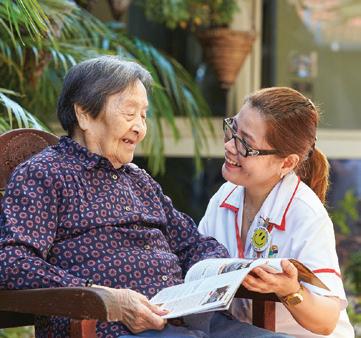


White Oak Complete Community Care
Sunflowers face each other to share their energy. Imagine if you could do this too.

With Southcare you can.
Let us help you with your care needs to age well at home.
Personal care
Allied health services
Dementia support
Transport
Gardening
Cleaning and home maintenance
Shopping
Meals
Short-term in home carer respite
Specialised equipment
Community connections
Surround yourself with people that feel like sunshine.

Do they have a Service Agreement? It is important so that there’s no misunderstanding about the service and cost to be provided. Are they flexible? After all, it is all about you. Do you get to decide what times and days suit your needs? Is there a criminal background check performed prior to employment with an agency? How do they determine appropriate staff for your needs? Is it possible to interview potential carers and make a selection after those interviews? Do they have male/female workers and can they cater for specific cultural backgrounds? And what is the minimum shift length? Who will be working in the home? Will there be regular staff providing continuity of care or do they change shifts around? Is there a professional staff member, such as a Registered Nurse, that provides a plan to meet the needs of the client? Who is the organisation’s main contact for you? What additional support is offered within the cost of your care? For example, are they available 24-hours a day, seven days a week. You’ll find a list of In Home Care service providers from page 153 in this Guide or visit AgedCareGuide.com.au to find providers servicing your location. Centre Based Care services
Centre Based Care (CBC) offers care in a ‘centre setting’ and may include structured group activities designed to develop, maintain or support the capacity for independent living and social interaction.
CBC provides the perfect setting to meet new people, and feel connected and engaged with your local community. There are various, individualised CBC services offered to you, as well as your carers. Some of the types of CBC services offered by some providers across Australia may include: Social support provided in a group setting through structured and diversionary activities Group excursions/outings conducted by centre staff but held away from the centre Light refreshments as well as meals Transport associated with getting to and from the centre as well as for outings/excursions/day trips Respite for carers
Overnight care Allied health services What can I expect from CBC? The programs organised by CBC service providers aim to provide you with companionship and entertainment, while enhancing your quality of life and stimulating you emotionally, mentally and physically. The centres may also focus on health and wellbeing by providing daily exercise programs and access to allied health needs such as diversional therapy, meal service, occupational therapy, access to podiatry, hairdressing and physiotherapy. Interactive activities at these centres may include arts and craft, cooking, history, gardening, self help and mutual problem solving. Types of CBC services available include day care, dementia day care, overnight respite, dementia group, social group, and respite care. Some CBCs charge a daily fee to cover everything from transport to group excursions/outings and meals or light refreshments. Ensure you enquire about the fees and charges involved before using CBC services. CBC fees and charges may vary from centre-to-centre, with charging a daily fee to cover everything from transport to group excursions/outings and meals or light refreshments. For a list of CBC services see pages 154–155. Day Therapy Centres Day Therapy Centres (DTC) offer services to older people living in the community and residents of Government funded aged care homes.
There are more than 140 Day Therapy Centres Australia-wide offering: physiotherapy social work occupational therapy preventative and/or personal therapies speech therapy transport to and from the DTC podiatry food at the DTC diversional therapy and many other services. DTC can assist to either recover or maintain a level of independence. Generally, the DTC will develop an agreed care plan for you and this may include recommendations for therapy and referrals to other service providers where necessary. You may be required to pay a small negotiated fee for services, however, if you are unable to pay you may not be refused access to DTC services. If you find yourself in need of therapy service like those listed, you will need to find out if you’re eligible via RAS assessment. Call My Aged Care for an assessment, ask for a referral code, and then choose the DTC you want. You’ll find a list of DTC on page 155 of this Guide.
Day Therapy Centres
Helping you at home
lt may be coming home from hospital and requiring help for a period of time, or using our services to just generally help out with busy lives.

OUR SERVICES
Companion care Dementia care Disability care Domestic assistance Escorts to appointments/outings Personal care Respite care Shopping Gardening Home maintenance Pet sitting/Dog walking
AREA SERVICED Perth
9371 9115 lowernorthperth@simplyhelping.com.au simplyhelping.com.au Veterans’ support If you are a veteran, war widow or widower, you may be in line to receive extra help in your home from the Department of Veterans’ Affairs.
If you are having a hard time doing the regular household chores, struggling to get in and out of the shower or bath safely, or if you just can’t manage the gardening or household maintenance, then the Veterans’ Home Care (VHC) program could organise people to help you. The VHC program offers a range of services including domestic assistance, personal care, safety related home and garden maintenance, or respite care in your own home or residential care facility. If you have specific medical care needs or need more intensive assistance, a nurse from the Community Nursing program may be able to help you stay in your own home for longer. Services may include medication management, wound care or hygiene assistance. To receive these services, you need to be referred for an assessment by an appropriate health professional. This could be your GP, a treating doctor in hospital, a hospital discharge planner or a VHC assessment agency. So if you’re a veteran or a war widow or widower please call the Veterans’ Home Care line on 1300 550 450 to find out what support services are available to you and how you can access them. A well earned rest
Taking some time off from caring is crucial and known as ‘respite’. Respite can be provided in your own home, a community setting or an aged care home.
Respite care offers the opportunity for both you and your carer to take a break. This may be for a few hours, a day, a night or a few weeks. Respite care is provided by residential aged care homes and by community care services under the Commonwealth Home Support Programme (CHSP). Accommodation and services include: day care centres that provide respite for a half or full day; in home respite services, including overnight, home and personal care services; activity programs; a break away from home with a support worker; respite for carers of people with dementia and challenging behaviours;

Transition care
respite in an aged care home or overnight in a community setting; and respite for employed carers and for carers seeking to return to work.
Eligibility Access to respite care is based on priority and need. For respite care in your home or in a day care centre, the respite service provider or Carer Gateway will assess whether you and your carer are eligible. The amount of care you receive will depend on your needs and the availability of respite care services.
Centre Based Respite Care Caring for an elderly or frail loved one can be difficult and a well deserved break is often needed. Centre Based Respite Care (CBRC) can provide this respite service to carers, offering individualised social and recreational activities. Through CBRC, you can also attend day programs which may include excursions, outdoor/indoor activities, or holiday programs.
Cost There is no charge for assistance provided through the Carer Gateway, however, individual service fees may apply. Community based respite services charge fees according to the type of service being used and your ability to pay. For more information contact the Carer Gateway on 1800 422 737. Your call will automatically be directed to your nearest State or Territory provider. Regaining your independence
To help improve your independence and confidence at the end of a hospital stay, the Transition Care Program provides short term support and assistance.
The Transition Care Program is goal oriented, time limited and therapy focused care which can be delivered in your own home or in a home like ‘live in’ setting, which may be an aged care home. To be eligible for transition care, you must be an in-patient of a hospital and have been assessed by the Aged Care Assessment Team (ACAT). Transition care can be provided for a period of up to 12 weeks, with a possibility to extend to 18 weeks if assessed as requiring an extra period of therapeutic care. Seven weeks is the expected average. Services Transition care is delivered by approved providers who will offer a package of services including a range of low intensity therapy services and nursing support and/or personal care services. Low intensity therapy services may include: physiotherapy speech therapy occupational therapy podiatry dietetics counselling and social work
Personal care services may include: help with showering and dressing assistance with eating and eating aids managing incontinence transport to appointments help with mobility and communication Fees You may be charged a contribution fee to cover the cost of your transition care. The maximum fee is 85 percent of the basic daily rate of a single pension for care delivered in a ‘live in’ setting, such as a residential aged care facility, called the maximum basic daily fee. This rate is currently $52.25 (July 2020 rates). For care provided at home, it can be up to 17.5 percent of the basic daily rate of a single pension. Access to transition care is decided on a needs basis and not on your ability to pay fees. Talk to your hospital social worker or discharge planner to find out more about how to access the transition care program. Aged care homes offering transition care beds are listed in the residential aged care tables on pages 120–138. Flexible restorative care
To help regain your independence if you have not been admitted to hospital, the Government has introduced a new flexible care option.
You may benefit from the Short Term Restorative Care (STRC) program if you have been sick or had a fall and your mobility is temporarily impaired. The program focuses on regaining wellbeing over a short period of time, with a maximum of eight weeks. Federal Government created the program to reverse or slow functional decline in older people and help improve their health and wellbeing through the time-limited service. The ultimate aim is to avoid you having to access ongoing in home care services or residential care. A team of professionals would provide the service to help you adjust to the differences in your abilities. This could involve activities and exercises that will benefit your mobility or could result in home modifications to make everyday tasks more manageable. Services can be delivered at your home or in a nursing home. You may need to pay a small fee, although you won’t have to pay an accommodation payment if you receive STRC in a nursing home setting. You do need an assessment to access the program. This assessment is done by the Aged Care Assessment Team (ACAT) and is only valid for six months. You can access the STRC program twice over a 12 month period. Read more about ACAT on page 47 or call My Aged Care on 1800 200 422 for more information about STRC.
Restorative care
Community Visitors Scheme
Community Visitors Scheme Older Australians experience high rates of loneliness and social isolation but there are different initiatives to improve social connectedness and encourage interaction in the community.
One example is the Community Visitors Scheme (CVS), which targets loneliness and isolation amongst aged care service recipients through companionship. The initiative from the Department of Health uses volunteer visitors to meet with people through the CVS on a regular basis to provide friendship and social inclusion. The service focuses purely on companionship and the volunteer will not provide personal assistance like cleaning, personal care or nursing. The CVS improves quality of life to all involved with the program and has been proven to combat loneliness and isolation occurring in residential aged care or at home. Older people who would benefit from the CVS include people who have little contact with family or friends, are isolated from their own culture or heritage, have issues with their mobility which prevents them from participating in social activities, or other personal issues that might make it difficult to engage socially. What service is provided? A volunteer will visit at least once a week for an hour. The CVS tries to connect like-minded individuals and recipients with similar hobbies, interests and likes to facilitate a good friendship. There are a number of different types of volunteer visits under CVS: A residential volunteer visits a participant for a one-on-one visit at a residential aged care facility. Group residential volunteers visit a small group of residents at a residential aged care facility who have similar interests, like gardening or knitting. A home care volunteer visits a CVS recipient with an approved Home Care Package at their home once a week for one-on-one interaction. Volunteers are not visiting to monitor your standards of care from your aged care service provider, be involved in any of your financial affairs, or provide any form of nursing or personal care. Think of your volunteer visitor as a dear friend that has come over for a cup of coffee and a chat. To be eligible for the CVS, you have to be an older Australian who is at risk of or experiences loneliness, isolation or cultural loneliness. However, you have to be receiving a Government subsidised Home Care Package or be in residential aged care to be eligible for visits. In WA, the scheme is coordinated by Melville Cares Inc. For further information, visit the Melville Cares website, melvillecares.org.au/our-services/community-visitors-scheme or ring on 08 9319 0916.
Transport services Getting to appointments, the shops or social events can be challenging if you don’t have a car, and even more challenging if you have mobility issues.
There may be times when friends, family and neighbours are unable to help out. While transport can be part of Government funded supports, there is also a range of free or subsidised transport options available through a variety of outlets. Community organisations In Western Australia (WA), there are many volunteer groups, such as local churches, clubs or Rotary groups, that support frail elderly people over 65 years of age in many ways, including through transport services. These community volunteer transport services provide either direct transport or assist older people in accessing public transport. They can take you to appointments, out and about in your community, visiting friends and family, or go to the shops. Most of these community schemes or groups are staffed by volunteer drivers. Depending on the organisation the services may be free or you may have to pay a small contribution towards the organisation. St John’s WA provides a community transport service and patient transport service that supports older people who need to attend medical appointments or hospital, visiting loved ones, going to events or family gatherings, or for grocery shopping. To enquire or book the community transport service, call 08 9334 1300, or for the patient transfer service, ring 08 9334 1234. Local Councils Western Australia’s local Councils frequently offer transport in two forms – community buses and personal transport. Some council’s operate community buses on a weekly basis with many offering the convenience of door to door pickup and drop-off. There is usually a nominal minimal charge for using the community bus which may vary depending on where it is going. Additionally, some councils offer personal transport for medical, wellbeing and other essential appointments, and are usually provided by council volunteers. There is usually a minimum charge for the service, and fees may vary depending on the distance you are travelling and whether you require a return journey. Contact your local Council for more information about transport options in your area. Western Australian transport for seniors The Australian Government Pensioner Concession Card will give you access to cheaper public transport rates in Western Australia. You are eligible for cheaper public transport if you hold a Pensioner Concession Card, Health Care Card, Veterans’ Concession SmartRider, WA Seniors Card or Seniors Card.








